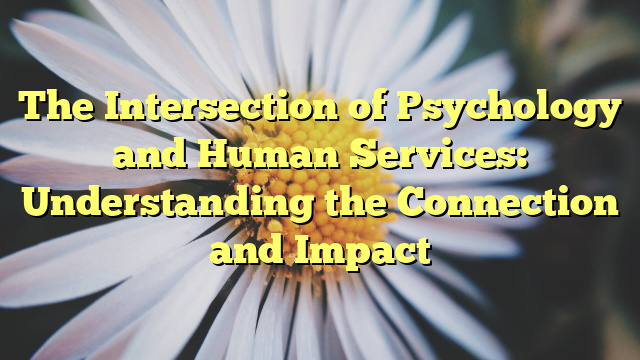The Intersection of Psychology and Human Services: Understanding the Connection and Impact
The Intersection of Psychology and Human Services: Understanding the Connection and Impact
Introduction
The fields of psychology and human services are closely intertwined, with each discipline informing and influencing the other. This article explores the intersection of psychology and human services, highlighting the connection between the two and the impact they have on individuals and communities.
The Connection between Psychology and Human Services
Psychology is the scientific study of the human mind and behavior, while human services refer to a range of professions and practices aimed at helping individuals and communities meet their basic needs and improve their overall well-being. The connection between psychology and human services lies in their shared goal of understanding and supporting individuals in their personal growth and development.
Psychological theories and research findings provide valuable insights into human behavior, cognition, and emotions, which can inform the practice of human services professionals. By understanding the underlying psychological processes, human services practitioners can better tailor their interventions and support to meet the specific needs of individuals and communities.
The Impact of Psychology on Human Services
Psychology has a significant impact on the field of human services. By applying psychological principles and theories, human services professionals can develop effective strategies and interventions to address various social issues and challenges.
For example, in the field of mental health services, psychologists play a crucial role in diagnosing and treating mental illnesses. They use their expertise in understanding human behavior and emotions to assess individuals’ mental health and develop appropriate treatment plans. This collaboration between psychology and human services ensures that individuals receive the necessary support and care to improve their mental well-being.
Psychological research also informs the development of evidence-based practices in human services. By conducting rigorous studies and experiments, psychologists generate knowledge about effective interventions and approaches to address social problems such as addiction, domestic violence, and poverty. Human services professionals can then utilize this research to inform their practice and provide the most effective support to individuals and communities.
The Impact of Human Services on Psychology
While psychology influences human services, the field of human services also has a significant impact on psychology. Human services professionals provide valuable insights and real-world experiences that contribute to the advancement of psychological knowledge and understanding.
Through their work with individuals and communities, human services practitioners encounter diverse populations and complex social issues. These experiences provide psychologists with a deeper understanding of the human condition and the factors that influence behavior and well-being. This knowledge can then inform the development of new theories and research in psychology.
Additionally, human services professionals often collaborate with psychologists in research projects and program evaluations. This collaboration allows psychologists to gain practical insights into the effectiveness of their theories and interventions in real-world settings. By working together, psychology and human services can continuously refine and improve their practices, ultimately benefiting individuals and communities.
The Role of Psychology and Human Services in Community Development
Psychology and human services play a vital role in community development by addressing social issues and promoting well-being. Through their combined efforts, these disciplines contribute to creating healthier and more resilient communities.
Psychologists and human services professionals work together to identify and address the underlying causes of social problems. By understanding the psychological factors that contribute to issues such as poverty, substance abuse, and homelessness, they can develop comprehensive strategies to address these challenges effectively.
Furthermore, psychology and human services collaborate to provide support and resources to individuals and communities in need. Human services professionals often work in community centers, schools, and social service agencies, providing counseling, case management, and other essential services. Psychologists contribute their expertise by offering psychological assessments, therapy, and consultation to individuals and organizations.
Conclusion
The intersection of psychology and human services is a powerful force in understanding and supporting individuals and communities. By combining their knowledge and expertise, these disciplines have a significant impact on addressing social issues, promoting well-being, and fostering community development. The connection between psychology and human services is essential for creating a more compassionate and inclusive society.

